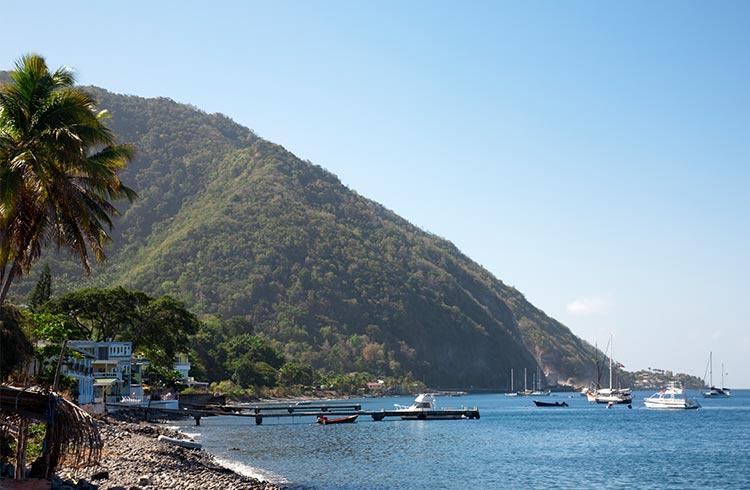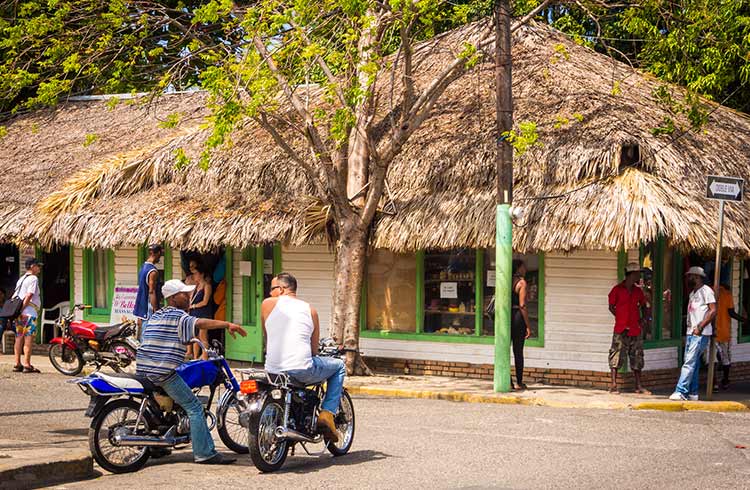Is Dominica Safe? 10 Essential Travel Safety Tips
How bad is crime on the Caribbean island of Dominica? While crime is mostly of the petty nature, many people arriving off a cruise ship aren't aware of potential dangers.
 Photo © Getty Images/youngvet
Photo © Getty Images/youngvet
The Caribbean island of Dominica is a mostly safe destination for travelers, and not much more than common sense safety rules apply here.
Dominica's natural wonders include mountains, rainforests, hot springs, waterfalls and freshwater lakes. It also has nine active volcanoes, and to put that into perspective, there are sixteen in all of the Caribbean.
Severe thunderstorms during hurricane season may cause landslides or disruptions to travel plans.
The threat of crime here is mostly petty theft. But before you go to Dominica, we share our top travel safety tips to keep you out of trouble, healthy and safe.
- How bad is crime in Dominica?
- Hiking safety in Dominica
- Muggings on L'escalier Tete Chien
- Can I drink tap water in Dominica?
- Common travel scams in Dominica
- Volcanoes and earthquakes in Dominica
- Hurricane season in Dominica
- Mosquito-borne diseases in Dominica
- Beach safety in Dominica
- Don't be alarmed
How bad is crime in Dominica?
Once you're captivated by Dominica's beauty, watch out for theft of unattended beach belongings or valuables in cars. Special precaution should be taken in your accommodation. Villas are sometimes robbed, particularly in the area of Calibishie. Keep your things locked up in a safe, and always lock your doors and windows.
Make sure the owner of your rental has insurance and demand proof of it; otherwise, you won't be able to get compensated if you are robbed on the property. If staying in a hotel, lock your prized possessions in the safe, and if in a guesthouse, secure your luggage in a locker with a padlock. Those on boats should also be wary of wayward thieves, as yachts are also hotspots for burglary.
Follow the rules for travel to all foreign destinations when it comes to guarding personal property. Keep wallets in front pockets or compartments and purses securely around you. Be watchful when shopping or going out to eat, as these are vulnerable times when thieves can attack.
Is it safe to drive in Dominica? Read these tips to get around the island safely.
Hiking safety in Dominica
If you go hiking in Dominica, pack sturdy hiking boots that have been worn in, as the terrain can be rocky and slippery.
Packing wet weather gear, as the weather can change quickly, bringing heavy rainfall. Carry insect repellent and anti-itch cream in case you get bitten by something.
Consider anti-nausea medication for car rides up and down winding mountain roads if you are prone to motion sickness.
Wear lightweight, breathable clothing for the hot weather conditions, to avoid discomfort or getting your clothes wet from sweat.
Muggings on L'escalier Tete Chien
The L'escalier Tete Chien is one popular tourist spot where you should be especially careful while hiking. Muggings have been reported by hikers, and travelers said criminals tried to get into their car when they drove in Sineku Village near the start of the trail.
Some travelers recommend not doing this hike to avoid the danger. If you decide to go, keep your vehicle doors locked and windows rolled up as you drive through the village. Go hiking with a group or a local guide to lower your chances of being targeted for muggings.
Can I drink tap water in Dominica?
Water is generally safe to drink, but may sometimes be brown in color after heavy rainfall, which overflows and brings silt from riverbanks. Drink purified water if you're worried.
One final handy tip: Always carry your own toilet paper to avoid getting caught short in public toilets.
Common travel scams in Dominica
Some travelers have reported feeling duped by charges for tours, food and other items. There's often a 10% Value Added Tax (VAT) on certain services, but it's not always clearly stated when it's included and when it's added after. Some accommodation providers double charge, billing guests for a room fee before adding on the VAT.
Some tours may not specify what's not included in the price. Some of these things are beverages, but others are actually sites you may need to pay extra for. With both hotels and tours, read the tour literature carefully and ask exactly what is and what's not included. Always bring extra cash just in case, and make sure to get the quotes in the correct currency. While you should do your research, it's best to book tours quickly, as the slots fill up with cruise-ship vacationers.
While it's not a scam, one of the first examples of aggressive behavior you'll see on Dominica involves persistent tour guides. Many will try to get you to hop into their taxis. If you ignore them and just walk through their line of defence, you'll probably shed them for good.
Volcanoes and earthquakes in Dominica
The Morne aux Diables volcano is collapsing, and if it completely falls apart, it could trigger a large tsunami.
Most of the active volcanoes are at the south end of the island, and are near the capital city of Roseau. There is a high risk of future eruptions that could possibly cause ash, lahars and lava. There are estimates that 90% of Dominica's population resides within 3mi (5km) of a live volcano. Find out about the evacuation plan when you arrive at your accommodation, just in case an eruption does occur.
Dominica is located in a seismically active region, and is prone to severe earthquakes. In November 2004 there was a 6.3 magnitude earthquake, and in November 2007 there was a 7.4 magnitude earthquake in Martinique that was felt in Dominica, causing power outages throughout other islands in the Caribbean. Again, ask your accommodation if they have an earthquake safety plan in place, and know where to go in the event of an emergency.
Hurricane season in Dominica
Hurricanes are most possible during hurricane season, which lasts from June to the end of November.
If you are traveling Dominica during this time, monitor local weather updates and follow the advice of authorities if there is an evacuation or warning in place.
The country has had fewer storms than other Caribbean islands, though Hurricane Dean in 2007 and Hurricane Maria in 2017 caused extensive damage and loss of life.
Flash floods and landslides can occur as a result of storms, and several fatal floods have occurred over the last century. Landslides can also make driving conditions treacherous.
Mosquito-borne diseases in Dominica
As far as illnesses, dengue fever is possible in any part of the Caribbean at various times of the year. It's carried by mosquitoes and produces fever, aches and rash and can turn severe. Wear the appropriate insect repellent when traveling throughout Dominica. Some towns spray chemicals to kill off insects like mosquitoes around the island, and the fumes may get into homes or accommodations with open windows. Otherwise, poisonous bugs are not so common on the island. Some people might also experience boils and fingernail and toenail fungi when they go to Dominica. Anyone in need of simple health care can got to Roseau's Princess Margaret Hospital.
Beach safety in Dominica
Dominica has few beaches, so you won't have to worry about many shore dangers. It is a prime spot for snorkeling and scuba diving, however, so take the necessary precautions when doing those activities, and only go with tour groups that have good reviews online.
Don't be alarmed
Though it may look menacing at first, don't be alarmed when you see locals carrying machetes. These locals are most likely on their way to cut crops for agricultural work, not your head.
Before you buy a travel insurance policy, check your government travel warnings and health advice – there may be no travel insurance cover for locations with a government travel ban or health advice against travel.
Related articles
Simple and flexible travel insurance
You can buy at home or while traveling, and claim online from anywhere in the world. With 150+ adventure activities covered and 24/7 emergency assistance.
Get a quote
2 Comments
Some adjustments as i live on the island. VAT is actually 15%. Never buy drinks from a hotel as they tend to double or triple charge. Theft isn't that common (against tourists). Most years go by with none, and on bad years, 3 or 4 robberies. Compared to global crime rates, this makes Dominica in fact, the safest Caribbean and one of the safest world destinations for tourists. Your biggest issue is finding something to do here. Apart from tour guides, most people cant be bothered to pay attention to tourists, too busy trying to survive, so you end up with not much to do.
Hi, am I able to use my American car seat for my toddler in Dominica?